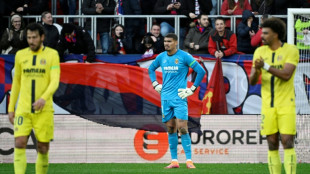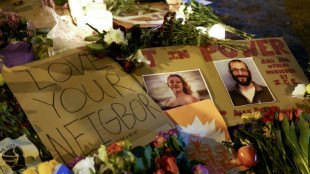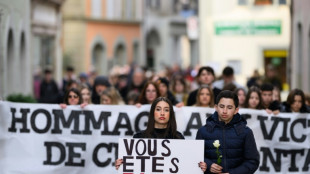-
 Israel partially reopens Gaza's Rafah crossing
Israel partially reopens Gaza's Rafah crossing
-
Iran declares European armies 'terrorist groups' after IRGC designation

-
 Snowstorm disrupts travel in southern US as blast of icy weather widens
Snowstorm disrupts travel in southern US as blast of icy weather widens
-
Denmark's Andresen swoops to win Cadel Evans Road Race

-
 Volkanovski beats Lopes in rematch to defend UFC featherweight title
Volkanovski beats Lopes in rematch to defend UFC featherweight title
-
Sea of colour as Malaysia's Hindus mark Thaipusam with piercings and prayer

-
 Exiled Tibetans choose leaders for lost homeland
Exiled Tibetans choose leaders for lost homeland
-
Afghan returnees in Bamiyan struggle despite new homes

-
 Mired in economic trouble, Bangladesh pins hopes on election boost
Mired in economic trouble, Bangladesh pins hopes on election boost
-
Chinese cash in jewellery at automated gold recyclers as prices soar

-
 Israel to partially reopen Gaza's Rafah crossing
Israel to partially reopen Gaza's Rafah crossing
-
'Quiet assassin' Rybakina targets world number one after Melbourne win

-
 Deportation raids drive Minneapolis immigrant family into hiding
Deportation raids drive Minneapolis immigrant family into hiding
-
Nvidia boss insists 'huge' investment in OpenAI on track

-
 'Immortal' Indian comics keep up with changing times
'Immortal' Indian comics keep up with changing times
-
With Trump mum, last US-Russia nuclear pact set to end

-
 In Sudan's old port of Suakin, dreams of a tourism revival
In Sudan's old port of Suakin, dreams of a tourism revival
-
Narco violence dominates as Costa Rica votes for president

-
 Snowstorm barrels into southern US as blast of icy weather widens
Snowstorm barrels into southern US as blast of icy weather widens
-
LA Olympic chief 'deeply regrets' flirty Maxwell emails in Epstein files

-
 Rose powers to commanding six-shot lead at Torrey Pines
Rose powers to commanding six-shot lead at Torrey Pines
-
Barca wasteful but beat Elche to extend Liga lead

-
 Konate cut short compassionate leave to ease Liverpool injury crisis
Konate cut short compassionate leave to ease Liverpool injury crisis
-
Dodgers manager Roberts says Ohtani won't pitch in Classic

-
 Arsenal stretch Premier League lead as Chelsea, Liverpool stage comebacks
Arsenal stretch Premier League lead as Chelsea, Liverpool stage comebacks
-
Korda defies cold and wind to lead LPGA opener

-
 New head of US mission in Venezuela arrives as ties warm
New head of US mission in Venezuela arrives as ties warm
-
Barca triumph at Elche to extend Liga lead

-
 Ekitike, Wirtz give Liverpool sight of bright future in Newcastle win
Ekitike, Wirtz give Liverpool sight of bright future in Newcastle win
-
West Indies 'tick boxes' in shortened T20 against South Africa

-
 Chelsea have something 'special' says Rosenior
Chelsea have something 'special' says Rosenior
-
De Zerbi 'ready to go to war' to solve Marseille troubles

-
 Hornets hold off Wemby's Spurs for sixth NBA win in a row
Hornets hold off Wemby's Spurs for sixth NBA win in a row
-
Moyes blasts killjoy booking after Everton's late leveller

-
 Ex-prince Andrew again caught up in Epstein scandal
Ex-prince Andrew again caught up in Epstein scandal
-
Bayern held at Hamburg to open door for Dortmund

-
 Atletico stumble to draw at Levante, Villarreal held
Atletico stumble to draw at Levante, Villarreal held
-
Chelsea stage impressive fightback to beat West Ham

-
 Arsenal stretch Premier League lead, Chelsea fightback breaks Hammers' hearts
Arsenal stretch Premier League lead, Chelsea fightback breaks Hammers' hearts
-
Napoli edge Fiorentina as injury crisis deepens

-
 How Lego got swept up in US-Mexico trade frictions
How Lego got swept up in US-Mexico trade frictions
-
UK rights campaigner Tatchell arrested at pro-Palestinian protest

-
 Iran says progress made towards US talks despite attack jitters
Iran says progress made towards US talks despite attack jitters
-
'Empowering': Ireland's first female sumo wrestler blazes a trail

-
 US judge denies Minnesota bid to suspend immigration sweeps
US judge denies Minnesota bid to suspend immigration sweeps
-
AC Milan prolong France 'keeper Maignan deal by five years

-
 Arteta hails Arsenal's statement rout of Leeds
Arteta hails Arsenal's statement rout of Leeds
-
Marseille buckle as Paris FC battle back for draw

-
 Protesters demand 'justice' one month after Swiss bar fire
Protesters demand 'justice' one month after Swiss bar fire
-
Philadelphia's Paul George gets 25-game NBA drugs ban

Iran's Nuclear Ambitions
The recent US military strikes on Iran's nuclear facilities have raised questions about the current state of Iran's nuclear program and its potential to develop a nuclear weapon. While the US administration claims that the strikes have "completely and totally obliterated" Iran's key nuclear enrichment facilities, there are conflicting reports and expert opinions on the true extent of the damage.
On June 22, 2025, the United States launched a series of airstrikes on three major Iranian nuclear sites: Fordo, Natanz, and Isfahan. The operation, codenamed "Midnight Hammer," involved B-2 Spirit stealth bombers dropping massive bunker-buster bombs and a submarine launching Tomahawk missiles. President Donald Trump announced that the strikes were a "spectacular military success" and that Iran's nuclear ambitions had been "obliterated."
However, a leaked preliminary intelligence assessment from the Defense Intelligence Agency suggests that the strikes may have only set back Iran's nuclear program by a few months. According to sources familiar with the report, the attacks sealed off the entrances to two facilities but did not collapse their underground structures. Additionally, it is believed that some centrifuges used for uranium enrichment might still be intact.
Further complicating the picture, there are indications that Iran may have relocated its stockpile of enriched uranium prior to the strikes. Satellite imagery from the days before the attack shows trucks at the Fordo and Isfahan sites, possibly moving materials away from the facilities. If Iran has safeguarded its enriched uranium, it could potentially resume its nuclear activities more quickly than if the stockpile had been destroyed.
The International Atomic Energy Agency (IAEA) has confirmed that the three sites were hit and has reported extensive damage, particularly at Esfahan and Fordo. However, the agency also noted that there has been no increase in off-site radiation, suggesting that any radioactive materials were not released during the attacks.
Experts are divided on the long-term impact of the strikes. David Albright, president of the Institute for Science and International Security, stated that restoring Iran's nuclear program would require significant time, investment, and energy, and that Iran risks further attacks if it attempts to rebuild. Conversely, Jeffrey Lewis, a professor at the Middlebury Institute of International Studies, argues that the program is not destroyed and that Iran might still possess the necessary materials to continue its pursuit of nuclear weapons.
Prior to the strikes, the IAEA had reported that Iran possessed over 400 kilograms of uranium enriched to 60%, which is close to the 90% purity needed for a nuclear weapon. If this stockpile remains intact, Iran could theoretically use it to produce a bomb relatively quickly, provided it can rebuild its enrichment capabilities.
However, with the facilities damaged, Iran would need to reconstruct its infrastructure, a process that could take months or even years, depending on the extent of the damage and the resources available to Iran.
Moreover, Iran is now under intense international scrutiny, and any efforts to rebuild its nuclear program would likely face strong opposition, including the possibility of further military action.
In conclusion, while the US strikes have undoubtedly inflicted damage on Iran's nuclear facilities, the true impact on Iran's ability to develop a nuclear weapon remains uncertain. The status of Iran's enriched uranium stockpile and the resilience of its underground facilities are key factors that will determine how close Iran is to possessing a nuclear bomb. As of now, it is unclear whether the strikes have significantly delayed Iran's nuclear ambitions or merely caused a temporary setback.

Trump's attack on the Dollar

Greenland Deal – and now?

Trump's hesitation in Iran

Cuba’s bleak oil crisis

Venezuela’s economic roadmap

Iran unrest and US threats

Iran's collapse fuels Revolt

Brexit's broken promises

France's debt spiral Crisis

Trump preps Allies for Ven Op

UK politics: Outlook for 2026



